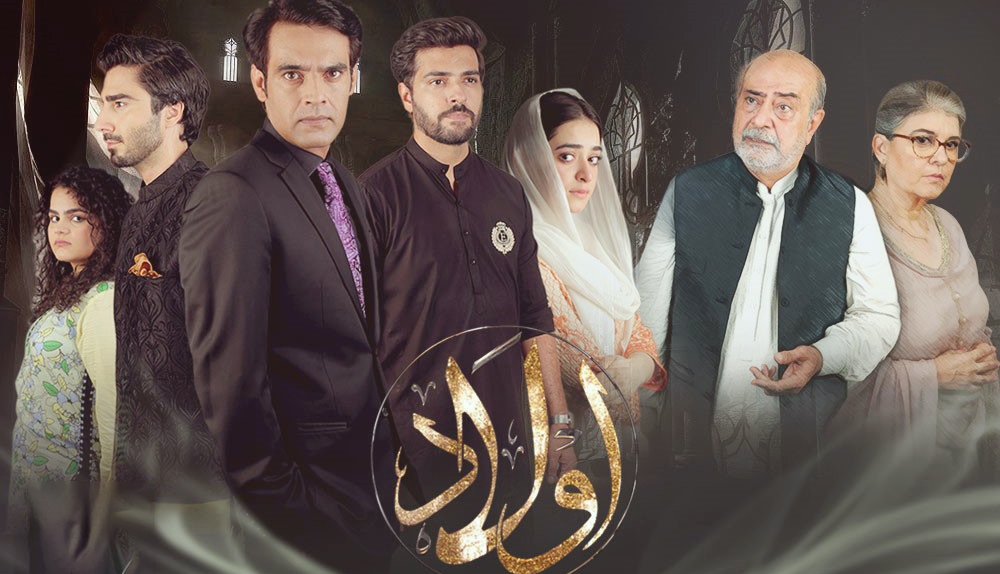“Aulaad” has been an emotional ride during the course of its run. This drama has told the story of a set of parents and the grief they experience at the hands of their (male) children. Starring Mohammad Ahmed, Marina Khan, Hassan Niazi, Sunita Marshall, Furqan Qureshi, Hina Javed, Nabeel Zuberi, Minsa Malik, Qudsia Ali and others, the story has been written by Syed Ameer Ali Shah and directed by Aabis Raza.
In the finale of “Aulaad,” we see several things happen in order to tie the story up in preparation for the end – but unfortunately, things are not tied up neatly at all. After Bilal (Nabeel Zuberi) discovered Muskaan’s treachery, he abandoned her and is now left wondering what to do with himself. Things only get worse after Muskaan suffers a miscarriage due to high blood pressure and is informed that she will never be able to have children again. The relationships in “Aulaad” are very fickle at times and despite all the catastrophes Muskaan has caused, it’s still miserable to see Bilal leaving a tearful, mourning Muskaan alone in the hospital. Muskaan’s end is, of course, that she’s left all alone with her mother, the two left only with what they worked so hard for – money and a house, but without any love or familial relationships.
Meanwhile, Adnan (Furqan Qureshi) is struck with a realization after hearing a speech about the importance of parents at an event where he’s presented with an award. Adnan realizes that while he has this award and success, he doesn’t have his loved ones around him to share it with. This is enough for him to snap and decide to move back home. Again, it’s rich to see Adnan put all the blame for his decisions and choices on his wife as if he wasn’t capable of shutting down her “blackmail.” This is another point that doesn’t sit well. Still, Adnan, Farwa (Hina Javed) and their son make the move back home – but are, unfortunately met with disdain, being cast out without forgiveness. Bilal also meets the same fate, even after Zakiya (Marina Khan) is made aware of the tragedy that has befallen him. But both Jalal (Mohammad Ahmed) and Zakiya have become stone-hearted in regard to their children – and while one can sympathize, it comes across as a bit too much. Too put it simply – it’s too harsh.
Khurram (Hassan Niazi) is also released from jail and the three brothers are seen bonding, consoling each other over the loss they’ve all experienced. What is actually beautiful about this scene is that their heartbreak over losing their parents has brough the once-waring brothers together in affection, brining them closer than ever. Hassan Niazi, Nabeel Zuberi and Furqan Qureshi are the real stars of the finale, each actor putting their best foot forward while portraying these emotional sequences. It only goes to show what great actors these men are and they make a strong impact with their performances.
There are several loose ends left dangling with “Aulaad,” but there’s one in particular that’s left unacknowledged. How can Khurram be left out in the cold when his wife and children are living with his parents? Does Khurram go back to his parents then? Why isn’t this addressed at all in the end?
Aakhir Kab Tak Episode 4: Fajar’s Mental State Deteriorates Post Attack
Life isn’t easy and life doesn’t get wrapped up in a pretty box at the end, neat and tidy, done and dusted – because, well, it’s life and it will continue long after the credits of a story roll. It’s no surprise then that the ending of “Aulaad” isn’t neat and tidy and, honestly, the audience as a whole couldn’t possibly have expected a magical fix after everything this family has been through. However, one thing is certain – the audience certainly did not expect the ending we’ve been given, one that is open-ended and heavy on the concept of “punishment.” On one end, there are shows out there that are pushing forth concepts of forgiveness, not only for the sake of others, but for the sake of one’s self and mental health (ex: Safar Tamam Hua). It’s such endings that make stories feel “real” and make viewers connect with the idea of “humans make mistakes,” something which is relatable for us all. In the case of “Aulaad,” the punishment meted out is harsh, unforgiving and states that “Don’t treat your parents harshly or unfairly, because they will never forgive you and you will be without their blessings in the end.” But what about the concept of unconditional love? “Aulaad” has been a heavy watch and remains heavy until the very end. Family goes through ups and downs, but the image painted with “Aulaad” is that of downs and only downs.
